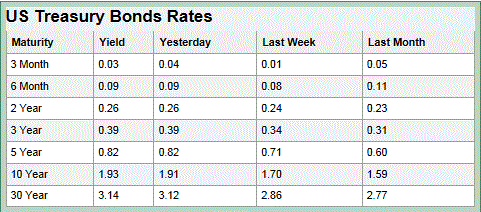Banking, finance, and taxes
Beware the Sharp Rise in Treasury Yields (GS, TBT, TLT, MORT, XHB)
Published:
Last Updated:

Goldman Sachs Group Inc. (NYSE: GS) is already calling for higher Treasury yields on top of the yield rise we have seen in recent days and weeks. With the 10-year yield around 1.935% now, the bulge-bracket firm and primary dealer sees the 10-year Treasury yield rising up to 2.00% to 2.25% in the near-term. The question that has to remain in the back of investors’ minds is whether or not THIS TIME really will be different. If the DJIA really rises more than 11% to our 14,590 peak target of 2013 will bonds still be as attractive? Very likely that answer is no.
Time after time we have seen large “generational high calls” in bond prices, meaning that bond yields supposedly cannot go any lower. That assumes that the economy does not roll back over into recession and that the rest of the globe does not drag the U.S. down with it.
All you have to do is to look at the yield curve below. Long-term rates are not just on the rise. They have been rising handily. The rise in rates will come with a sting for long-term bond holders. A two basis-point rise in the two-year Treasury will not really hurt any investor’s portfolio. What about a rise of closer to 40 basis points in the 10-year and 30-year Treasuries? Bonds are supposed to be safe but investors are not going to like it when their statements show big losses in their long-term bonds.
The most recent rise in rates has been adding to the value of the battered ProShares UltraShort 20+ Year Treasury (NYSEMKT: TBT). This has driven its price up to $67.30 versus a 52-week range of $56.32 to $86.20. The value of this “leveraged short fund” has risen 10% in just the last month. On the other hand, the iShares Barclays 20+ Year Treasury Bond (NYSEMKT: TLT) has tanked in price: at $117.45, its 52-week range is $109.69 to $132.21 and its implied yield based on the last payout was put around 2.7%.
With mortgages and funds tied to them having such a focus on how low long-term rates can remain, we would note that Market Vectors Mortgage REIT ETF (NYSEMKT: MORT) has actually withstood the rise in rates rather well.
Even the SPDR Barclays High Yield Bond (NYSEMKT: JNK) has held up well despite being a junk bond ETF. This has held up due to the underlying equity components holding up as well as S&P has shown that the “speculative grade composite spread” has narrowed down to 565 basis points. Some junk bonds are now trading with yields as low as the 5% mark. While the junk bond spreads have actually been tighter, they were up above 600 basis points just at the start of December.
It does not end there. Higher long-term rates mean higher mortgage rates. Higher and higher mortgage rates historically have been a drag on the housing market, which is currently still expected to remain in a fragile recovery. If the housing recovery stalls all over again, will that pressure an already-fragile broader economic recovery in the U.S. as many market historians worry? SPDR S&P Homebuilders (NYSEMKT: XHB) trades close to its multi-year high and its shares are up over 50% from the lows of 2012.
If you still have not noticed the very recent rise in rates, you better take a look. The 30-year Treasury is now at a yield not seen since a very brief spike in September of 2012 but they are now in position to challenge the rate pop going back to before last summer. Over the last month rates have risen 34 basis points in the 10-year Treasury Note and they have risen 37 basis points in the 30-year Long Bond. Here is a chart from Yahoo! Finance showing the rise in rates in just the last month:

The rising long-term Treasury yields might be a game-changer. The burning question remains just how different things may be this time around now that the fiscal cliff has been partially averted. The debt-ceiling fight continues. Stay tuned.
The last few years made people forget how much banks and CD’s can pay. Meanwhile, interest rates have spiked and many can afford to pay you much more, but most are keeping yields low and hoping you won’t notice.
But there is good news. To win qualified customers, some accounts are paying almost 10x the national average! That’s an incredible way to keep your money safe and earn more at the same time. Our top pick for high yield savings accounts includes other benefits as well. You can earn up to 3.80% with a Checking & Savings Account today Sign up and get up to $300 with direct deposit. No account fees. FDIC Insured.
Click here to see how much more you could be earning on your savings today. It takes just a few minutes to open an account to make your money work for you.
Thank you for reading! Have some feedback for us?
Contact the 24/7 Wall St. editorial team.